By John Helmer, Moscow
When it first appeared in Washington in December 2013, the semi-thousand page biography of Vladimir Putin by two minor American think-tank researchers, Fiona Hill and Clifford Gaddy, was judged to be a valuable compilation of everything the US news media and other government-funded think-tanks had already reported, suspected or believed about the Russian president for the previous decade. No more, no less. In Russia, since no knowledgeable or politically significant Russian contributed evidence to the book, much less.
The subsequent publication of chapters on the putsch in Ukraine in February 2014, the accession of Crimea, Russian military intervention in Syria in 2015, and the US war to overthrow Putin and fight Russia everywhere in cyberspace, added nothing more remarkable in Washington, and nothing novel (non-fictional sense) in Moscow.
But had Hill not been appointed a few weeks ago as President Donald Trump’s (lead image, right) director of Russia at the National Security Council (lead left), the principal foreign policy advisor serving the President, Hill’s book, with its one thousand and one footnotes, and fifteen single-spaced pages of references, led by Hill and Gaddy themselves, The Economist, and extracts from the Voice of America, would have been as inconsequential as they have already proved to be for years. However, Trump’s confidence in, and dependence on Hill’s advice on Putin, and the campaign to impeach Trump himself for high crimes and misdemeanours in association with Putin, change the way the book must now be interpreted.
Does the evidence that Hill spent two formative years as a student at an institute in Moscow where she rubbed shoulders with Russians bound for, and already bound to, the two state intelligence services, GRU (military intelligence) and SVR (foreign intelligence), require a counter-intelligence assessment because of the risk which was unforeseen until now?
Hill’s Moscow time is a detail of her resume which has yet to be identified in US media reporting and Congressional committee vetting. But as a Russian source from the institute points out, “this is especially curious if we take into account the fact that the Moscow State Linguistic University is a source of supply of employees for GRU and SVR. It was during the Soviet period, and it remains the same nowadays.” As another Russian source familiar with the secret services points out, by the standard of investigation the CIA, FBI and the US media now apply to Trump, his appointees, business associates, advisers, family, and friends, does this detail require special scrutiny for Hill? “Her book,” claims the source, “is so full of false leads and dead-ends, don’t the Americans wonder if Hill is a sleeper agent, recruited long ago with the mission to keep the Americans as ignorant of Russia as her book on Putin demonstrates?”
If Hill is a continuing Russian penetration risk at the White House, then is there also the risk that the potentially culpable General Michael Flynn, National Security Adviser between January 20 and February 13, 2017, and his successor General H.R. McMaster, have failed to protect Trump himself?
In her book Hill makes much of her Russian language and translation skills, including her own translation of Putin’s campaign biography of 2000. She doesn’t reveal that she got her skills from two years of study at the Maurice Thorez Moscow State Pedagogical Institute of Foreign Languages.
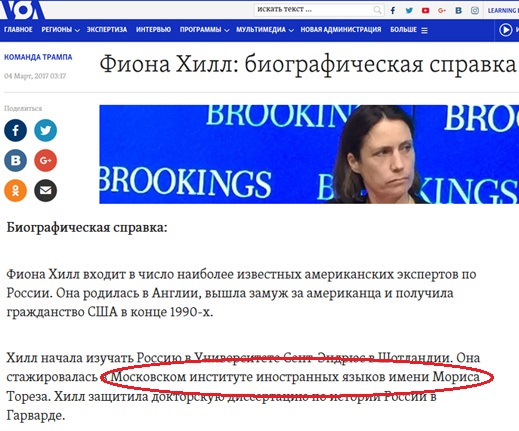
Source: Golos -- http://www.golos-ameriki.ru/a/fiona-hill--bio/3749369.html
The Thorez Institute was the Soviet-period name, commencing in 1935 to honour the French Communist Party leader from 1930, who spent the war years in the USSR before a brief term as Vice Premier of France. The institute operates at a converted 19th century mansion on Ostozhenka Street, in Moscow’s old city. Thorez’s name was removed in 1990, but it sticks to the school as durably as the new acronym, MSLU. The institute itself says it cannot confirm the years Hill was a student there until it searches its old paper archives, and that may take weeks.
There can be no doubt about the veracity of the report on Hill by Golos. That’s because Golos is the website publication of the Voice of America Russian Service, which gives its home address as 330 Independence Avenue, SW, Washington, DC 20036.
Hill’s alma mater in the UK, St. Andrew’s University, corroborates the detail in a profile published in 2012. “Fiona is now a US citizen,” the report says. She is married to Kenneth Keen (they both achieved an A.M. degree [in Russian studies] from Harvard in the same year) and together they have a five-year-old daughter. This person is an inspiration. She has proved that success comes when you do something you love and that there is no goal too high if you have the determination to see it through.”
According to the St. Andrews University report, “in 1987, during her academic year abroad, [Hill] used a grant from the British Council to travel to the Soviet Union and whilst there she studied Russian at ‘Maurice Thorez Moscow State Pedagogical Institute of Foreign Languages’ (the largest and oldest university in Russia).” But this wasn’t Hill’s only source of income in Moscow. Reportedly Hill also “worked as an unofficial correspondent and translator for NBC, which enabled her to meet Maria Shriver [daughter of President John Kennedy’s sister Eunice], and in 1989 she completed her MA Degree.”
A Harvard University alumni publication of 2014 reports different details, adding a year to Hill’s stay in Moscow, but omitting the study at Maurice Thorez Institute and the payment by the British government. Instead, “while on scholarship with the University of St. Andrews, Hill found herself in Moscow during the Reagan and Gorbachev Summit in 1988. As an intern for NBC’s Today Show, she was quite literally making coffee for Maria Shriver when an American professor struck up a conversation. When learning of Hill’s uncertainty around her plans for academe, he told her of U.S. scholarships for Russian studies. After several conversations, a few trips to the U.S. Embassy, and many chance encounters with Harvard graduates—Hill found herself applying for Harvard’s Kennedy Scholarship and Knox Fellowship.”
At Harvard the Knox Fellowship — a bequest from the fortune of the US Secretary of the Navy during World War II — is an award to graduate students from Great Britain and its three white colonies (Australia, Canada, New Zealand); it is rarer than the Rhodes Scholarship is for colonial students to Oxford. Hill’s two years in Moscow, her “trips to the US Embassy”, and her employment by the Kennedy family member apparently did the trick to open Harvard’s admission door. Hill told the Harvard Alumni Magazine: “Harvard did not seem like a possibility for the Bishop Auckland native. Though academically oriented, graduate studies at Harvard did not seem probable until that fateful day on the [NBC] Today Show set. Doors opened, the Harvard connection proved strong, and Hill was soon the recipient of the revered Knox Fellowship… ‘Absolutely everything I’ve done—my research, my training, my book—was made possible due to Harvard opening doors and providing me with connections’.”
Among the connections Hill disclosed, the most connected was her academic patron, Richard Pipes (right). 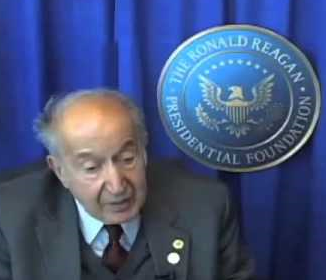 “Pipes,” Hill says, “took her under his wing to ensure she had the means to pursue her studies as a PhD candidate.” Pipes was at the time and for years before Hill was his recruit, a CIA contractor, chairman of the well-known Team B, and advisor to the neo-conservative US lobby for maximizing the Russian threat to the US. According to Hill, Pipes arranged her pay after the Knox Fellowship money ran out. Pipes’s theory, and the Team B assessment, were that Russian strategy was based on winning rather than deterring nuclear war with the US. They revived the idea during the Carter presidency and the following Reagan Administration, during the time Hill says she was in Moscow, in her Harvard student years, and her subsequent employment in US agency-funded operations for regime change in Russia. For more details, see the Brookings version and this backgrounder.
“Pipes,” Hill says, “took her under his wing to ensure she had the means to pursue her studies as a PhD candidate.” Pipes was at the time and for years before Hill was his recruit, a CIA contractor, chairman of the well-known Team B, and advisor to the neo-conservative US lobby for maximizing the Russian threat to the US. According to Hill, Pipes arranged her pay after the Knox Fellowship money ran out. Pipes’s theory, and the Team B assessment, were that Russian strategy was based on winning rather than deterring nuclear war with the US. They revived the idea during the Carter presidency and the following Reagan Administration, during the time Hill says she was in Moscow, in her Harvard student years, and her subsequent employment in US agency-funded operations for regime change in Russia. For more details, see the Brookings version and this backgrounder.
The Russian press paid little attention to the first edition of Hill’s book, Mr Putin, Operative in the Kremlin, when it first appeared in 2013. The Brookings blurb identified the book as making the case that “Vladimir Putin has become the greatest challenge to European security and the global world order in decades”, with endorsements from retired heads of the British Secret Intelligence Service and the CIA. Russian press coverage has been mostly limited to translations into Russian of English-language book reviews.
The second edition of the book and Hill’s promotion to the White House in February have been ignored by the Russian media in Russian and in English, overshadowed as Hill has been by the dismissal of her first boss, General Flynn; the opening of the FBI investigation of his links to Moscow; and the recent dismissal of FBI director James Comey as he extended that investigation to include Trump.
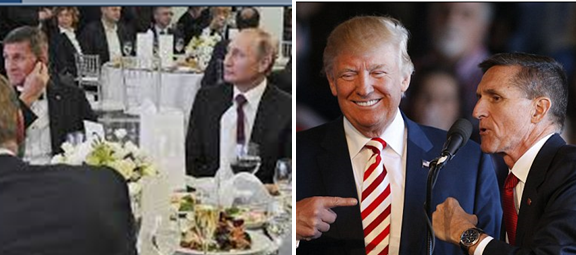
Left: Flynn with Putin, in Moscow, December 2, 2015; source: http://www.dailymail.co.uk/news/article-4321368/Flynn-got-paid-45-000-speech-sat-Putin.html Right: Flynn with Trump.
Flynn spent one evening in public with Putin in Moscow, and was paid $45,000 (gross, before commission and travel charges). Four months earlier, Flynn was paid to give speeches at two functions in Washington, DC, at $11,250 a time, by the Russian aircraft manufacturer Volga-Dnieper, and the Russian cyber security firm, Kaspersky. The amount of money Hill was paid for her time in Moscow was much less, but the time significantly longer.
US regulations for new White House appointments require the US Secret Service to reopen and review all earlier security clearance checks on Flynn and Hill, and their new answers to old questions about their time and contacts with Russians of interest. Traces the US services may have of the counterpart Russian files on Flynn and Hill, from the KGB, SVR, GRU and FSB, should also have been reviewed. What may have been logged into the files on Flynn is now leaking into the US press. Hill remains TOP SECRET, NOFORN, no leaks.
In intelligence operations, as in most things, he who pays the piper calls the tune. In counter-intelligence operations, the job is to figure out from the tune who is paying for it. At Brookings, Hill’s regular salary has been paid by a group of donors including government organs of the European Union, France, Italy and Norway; a group of Turkish businessmen; and the Ukrainian oligarch, Victor Pinchuk. For background on Pinchuk’s money, and the Russian insurance company from which it was stolen, read this.
Hill’s book on Putin was paid for, according to the acknowledgements in front, by Stephen Friedman, a Goldman Sachs banker who turned business advisor to President George Bush and Barack Obama’s chairman of the President’s Foreign Intelligence Advisory Board. Hill’s trips for interviews were paid for and arranged by the State Department’s “Strategic [sic] Speaker Program”; by US embassies and consulates in Germany, the Canadian defence ministry, and European think-tanks including Chatham House in London.
These were the pipers. Hill’s tune is more noteworthy for the notes she fails to play. No friend of Putin’s from his present or his past has been interviewed by Hill. There is no Russian informant from Putin’s KGB academy cohort (1984), nor Russians or Germans from his Dresden posting (1985-1990). The garruluous Sobchak family is missing from Hill’s informants on how Putin served as the Sobchak mayoral appointee in charge of the city’s external relations (1991-96).
Hill’s account of Putin’s business activities in St. Petersburg is from the press – not a single Russian or foreign businessman who dealt with him then (they included me in 1991), let alone a person of oligarch magnitude since then, has been interviewed for the book, or provided the information to which Hill refers. None of the business “cronies” now sanctioned by the US Treasury for being in Putin’s intimate circle has been identified as a source. Major figures like Gennady Timchenko, the Rotenberg brothers, Yury Kovalchuk, and Igor Sechin – about whose business affairs a great deal is known among their non-Russian bankers – are as unknown to Hill as Russian business affairs in general. Her account of the Pikalevo affair with Oleg Deripaska in 2009 demonstrates more of what Hill doesn’t understand about the Russian metals business than it does about Putin. Her assessment of Igor Sechin is equally missing evidence that she comprehends the Russian oil business, or knows those Americans who do, and who might be expected to talk to someone with Hill’s calling-card.
WHO’S WHO IN RUSSIA, WHO ISN’T IN HILL’S BOOK — TABLE SETTING FOR PUTIN’S CHRISTMAS DINNER WITH THE OLIGARCHS, DECEMBER 19, 2014 —
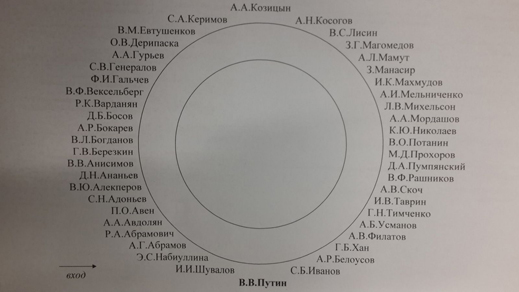
For reports on the annual Putin dinner for the oligarchs, read this (2014), and this (2015), and this (2016).
Not to understand the Russian energy and metals businesses is not to understand either Russia or Putin. To Russian experts, that Hill has written a long book to claim otherwise is either her folly, or a deadend into which Hill wants her readers, and now the President of the United States, to stumble.
Her advice to US policymakers and her conclusions are a combination of contradictoriness and clichés. Putin can be “overly trustful”, particularly of Americans; he also shows “he simply does not trust anyone.” He has “consistently shown that he can learn from his own policy or tactical mistakes”; in 2014 he demonstrated can’t learn with a “depiction of events in Ukraine [that was] irrational”. According to Hill, Putin started two wars – Georgia in 2008, Ukraine in 2014 – and has so far ended up successfully. His military engagement in Syria has also proved more successful, she concedes, than US engagements in Afghanistan, Iraq, Libya and Syria. Her conclusion: “he will fight dirty if that’s what it takes to win.” His modus operandi consists of “blackmail, intimidation, punishment and blatant distortion of the truth”. Consequently, efforts to persuade him will “likely be seen as a ploy”, and fail. He works “very hard at making him[self] as inscrutable and as unpredictable as possible”. But as clear and obscure as that is simultaneously, Hill sums up: : “the fact is that he does think differently from his US and European counterparts. He does see the West as a threat to him and his system.”
If this is Hill’s advice to her White House bosses, she is either saying they should give up trying to provoke Putin because he is dangerously unpredictable. Or else she is saying he is so dangerous, the White House priority should be to get rid of him. Either way, according to Hill, that’s exactly what Putin expects of the American leadership.
From a counter-intelligence perspective, is there a pattern to Hill’s selectivity of sources; her omissions, factual mistakes, inferences, conclusions, and recommendations? Is she trying to persuade the White House to act exactly like the Kremlin is predicting it will? And if this is the outcome of Hill’s book, has that been her mission to start with?
Hill concludes her book with a warning about Russian sleeper agents and the necessity for counteracting them with seeing-eyes in Washington. “If sleeper agents were still operating in Germany as recently as 2011”, Hill says on her last page, “the chances are that plenty of other Russian operatives are in place…waiting to subvert governments, discredit individual leaders who challenge Russia, and block any actions that run counter to Russian interests.” In a book filled as Hill has filled hers, is she the sleeper, or the seeing-eye? In these days in Washington can anyone tell the difference?


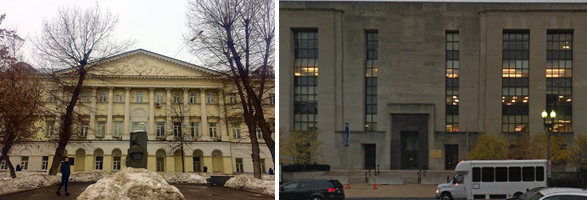










Leave a Reply